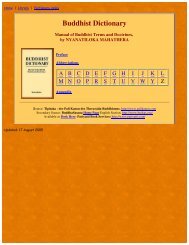The Three Basic Facts of Existence II: Suffering (Dukkha) - Buddhist ...
The Three Basic Facts of Existence II: Suffering (Dukkha) - Buddhist ...
The Three Basic Facts of Existence II: Suffering (Dukkha) - Buddhist ...
- No tags were found...
You also want an ePaper? Increase the reach of your titles
YUMPU automatically turns print PDFs into web optimized ePapers that Google loves.
<strong>Dukkha</strong> is <strong>of</strong> three categories:1. <strong>The</strong> dukkha inherent in an imperfect world in which there are all kinds <strong>of</strong> cataclysms,earthquakes, tidal-waves, floods; in which there is constant flux, change, motion,impermanence, instability, disease, and death, and in which life preys on life.2. <strong>The</strong> dukkha that is prevalent by reason <strong>of</strong> the inadequacies and injustices <strong>of</strong> social andeconomic systems.3. <strong>The</strong> dukkha or suffering that comes about through man’s wrong thinking and his spiritualignorance, which cause the blemishes and defects in his character.<strong>The</strong> most fundamental <strong>of</strong> these is the third, because this is the one that we can do most about.To some slight degree we can minimise or prevent some <strong>of</strong> the dire happenings mentioned inthe first category, such as floods, bush-fires, etc. We can find cures for disease and prolong life,but we have to accept the inevitability <strong>of</strong> impermanence and death. In regard to economic andsocial systems, it is within our power to change these entirely. As Omar Khayyam said:Oh love, couldst thou and I with fate conspire,to wreck this sorry scheme <strong>of</strong> things entire,and shatter it to bits—and then,remould it nearer to the heart’s desire.Admittedly, this at present is a somewhat Utopian dream, but at least it is within the realm <strong>of</strong>possibility, if not <strong>of</strong> probability. <strong>The</strong> third category <strong>of</strong> dukkha is the most important because allchanges have to be made by men themselves. In that lies the greatness <strong>of</strong> the Buddha. Heshowed the way by which a man can overcome his own ignorance which makes him seekhappiness in the wrong way and in the wrong directions. He showed him a positive way toachieve an abiding happiness not <strong>of</strong> an ephemeral nature. So we revert to the question, whatcan Buddhism do for you? If you recognise dukkha, it can help you to understand it, andunderstanding dukkha, to transcend it. Thus, we only aim to <strong>of</strong>fer the Teaching <strong>of</strong> the Buddhato those who have need <strong>of</strong> it. Those are the people who, at least, have some glimmering that lifeis dukkha. <strong>The</strong> man who has not suffered, and who is not capable <strong>of</strong> recognising orexperiencing any kind <strong>of</strong> suffering is incapable <strong>of</strong> growth. If he is still satisfied with orthodoxbeliefs that assure him that this is the “best <strong>of</strong> all possible worlds,“ that “God’s in his heavenand all’s right with the world,“ and who is content to go after the mirage <strong>of</strong> boundless pleasureon the ever-receding horizon <strong>of</strong> time, mistaking the shadow for the substance, quite candidlyand obviously, Buddhism is not for such a man. Thus we have been mildly rebuked about thefact that we do not try “to sell” Buddhism to anyone, that our attitude is “take it or leave it.” Wemust concede that, in essence, these charges are quite true. In the first place, Buddhism is onlysuitable for those who are sufficiently mature to be able to dispense with the props provided bythe orthodox beliefs. It is for those who wish to lead a life more meaningful for themselves andothers, for those who wish to avoid suffering, both in respect <strong>of</strong> themselves and others. Asregards the “take it or leave it” attitude, we know very well that that is what you are going to doanyway, and we do not wish to employ any form <strong>of</strong> pressure or coercion whatever. However,our attitude is not one <strong>of</strong> bland indifference. We think inwardly that the world would be a muchbetter place if it were to follow the teachings <strong>of</strong> the Buddha sincerely and pragmatically. <strong>The</strong>rewould be no wars, no exploitation, no rat-race, no “keeping up with the Jones,” and it wouldeven go beyond all this, for the final goal stated by the Buddha is Nibbāna.It is not through knowledge alone, but through experience <strong>of</strong> the world that we are broughtinto relation with it. <strong>The</strong> Buddha’s essential teaching was Nibbāna, the end <strong>of</strong> suffering. <strong>The</strong>way to Nibbāna is the Noble Eightfold Path, the goal <strong>of</strong> which is to stand out <strong>of</strong> objectiveexistence altogether. But, to be ready for this, an individual must experience a sense <strong>of</strong>29
















